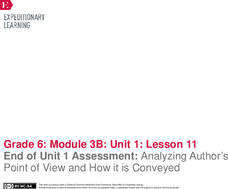Plainfield Public School District
Mood and Tone
"It was a dark and stormy night. Perfect for making Christmas cookies." Distinguishing between the mood of a piece and the tone can be tricky, but with the help of this presentation viewers quickly see and are able to identify the...
EngageNY
Introduction: The Ideas of Charles Darwin
Piece by piece ... Scholars read the text World without Fish by breaking the text into pieces. They identify challenging words and determine the gist of each section as they read. They then work together in triads to answer...
Teacher Writing Center
Spring Lesson
Ring in the spring with a study of adverbs. These spring worksheets cover when and how to use adverbs, provide plenty of adverbs to try out, and use images of spring as inspiration for students to tap into as they write original sentences.
EngageNY
End of Unit 1 Assessment: Analyzing Author’s Point of View and How it is Conveyed
One step at a time. Scholars complete the end of unit assessment by reading pages 70–75 of World without Fish and analyzing each paragraph one at a time. They highlight key words leading to author's point of view and complete a...
EngageNY
Mid-Unit 3 Assessment, Part 2: Explaining How New Information Connects to the Topic
Let's talk it out. Using the resource, scholars work in triads to discuss how their research has deepened their understanding about sustainable fishing. Next, pupils engage in a whole-class discussion to consider their next steps toward...
Curated OER
Following Directions 2
In this following directions worksheet, students will read three simple directions to color pictures of animals correctly. Then students will write the name of their favorite animal.
K12 Reader
Look at the Good Wood
Practice the oo digraph with a quick text and related questions. The short poem includes plenty of examples of the digraph. After reading, learners respond to the three reading comprehension questions.
Curated OER
Context Clues
Learners review and discuss what context clues are and then read six sentences and paragraphs and circle the correct context clue for each one.
Curated OER
Plants and Animals
Students find common needs between plants and animals. In this plants and animals lesson students compare that both plants and animals need food and water. They also find the differences between plant and animal needs.
Curated OER
Conditions at Sea Data Activity
Students study how to forecast sea conditions. In this oceanography lesson students complete a class activity on wave making.
Curated OER
Prediction Idioms Exercise
In this grammar worksheet, students explore idiomatic expressions. Students determine meanings of idioms through four matching and eight multiple choice questions.
Curated OER
Color the Biggest Fish
In this visual discrimination worksheet, students will analyze the sizes of the fish. Students will study five sets of fish and color that fish which is the biggest.
Curated OER
Color the Fish
In this coloring worksheet, students will look at a picture of 20 fish swimming in a pond. Then students will color all of the fish that are swimming to the left.
Curated OER
Reading Readiness
Develop the reading and vocabulary skills of young learners with this simple fill-in-the-blank activity. Using the provided word bank, children read and complete a series of five sentences by writing in the...
Curated OER
Problem-Solving Strategy: Guess and Check
Teach your class how to guess and check to solve word problems. There are 4 single step word problems for them to solve.
K12 Reader
Animal Proverbs and Adages
What will play when the cat's away? Practice figurative language with a list of proverbs about animals. Kids use the word bank at the top of the page to fill in the blanks based on their knowledge of common phrases.
Curated OER
Rules of Punctuation: Plurals
Take your class through a step-by-step exploration of changing words from singular to plural. Learners begin by answering a series of questions about a word, such as whether it ends in y. Then, they add the correct ending. There are tips...
Curated OER
Idioms with vez
Knowing idiomatic phrases gives learners a better idea of a language and its people. Introduce your scholars to idioms using the word vez. Answers are provided, but be sure to discuss some of the more difficult ones with your class!
Curated OER
Problem Solving
Give kids a few strategies to help them become amazing problem solvers. This presentation is intended to be used over a two-day period and presents several techniques or ways to solve word problems or multiplication problems by...
Curated OER
Chopping Cubes
Middle schoolers work in small groups to make various geometric solids with Play-Doh. They use fishing line to make cuts and observe the shapes of the cross-sections. Pupils complete an assessment in which they answer questions such as:...
Curated OER
Oh Say Can You DDDD!
Young readers see that letters represent phoneme sequences in spoken words. They identify the letter "d," and recognize "d" in spoken words by exploring the meaningful representation and a letter symbol. They practice finding the letter...
Curated OER
Ehhh...What'd you say?
Practice pronouncing and spelling words with the /e/ sound with spellers. They blend phonemes with spelling maps to master important representation and letter symbol of the short vowel /e/. They also make sock puppets and study the...
Curated OER
Exploring Arizona's Biotic Communities Lesson 2: Biotic Communities Vocabulary
Part of a unit on Arizona's biotic communities, this lesson focuses on the vocabulary to be used. Terms include biodiversity, topography, desert, hybridization, niche, and more! Youngsters will define these words from contextual...
Curated OER
Onset-Rime Segmenting Accuracy
Use a puppet (in this case named Mico) to make onset and rime more fun. Mico presents 12 picture cards to kindergartners, all depicting single-syllable words. He pronounces them with segmenting onset and rime, encouraging kids to say the...

























